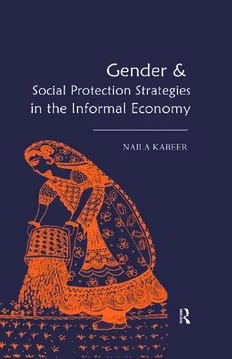
Gender and Social Protection Strategies in the Informal Sector PDF
Preview Gender and Social Protection Strategies in the Informal Sector
Gender and Social Protection Strategies in the Informal Economy This page intentionally left blank Gender and Social Protection Strategies in the Informal Economy Naila Kabeer LONDON NEW YORK NEW DELHI This edition published 2010 by Routledge 912–915 Tolstoy House, 15–17 Tolstoy Marg, New Delhi 110 001 Simultaneously published in the UK by Routledge 2 Park Square, Milton Park, Abingdon, Oxon, OX14 4RN Routledge is an imprint of the Taylor & Francis Group, an informa business Transferred to Digital Printing 2010 © Commonwealth Secretariat 2008 Originally published as Mainstreaming Gender in Social Protection for the Informal Economy. This edition is published by arrangement with the Commonwealth Secretariat. Typeset by Star Compugraphics Private Limited D–156, Second Floor Sector 7, Noida 201 301 All rights reserved. No part of this book may be reproduced or utilised in any form or by any electronic, mechanical or other means, now known or hereafter invented, including photocopying and recording, or in any information storage and retrieval system without permission in writing from the publishers. British Library Cataloguing-in-Publication Data A catalogue record of this book is available from the British Library ISBN: 978-0-415-57825-7 Contents List of Boxes and Tables vii List of Abbreviations and Acronyms ix 1. Risk, Vulnerability and Social Protection: International Perspectives 1 2. Gender and Trends in the Global Labour Force: New and Persisting Forms of Vulnerability 26 3. Gender, Life Course and Livelihoods: Analytical Framework and Empirical Insights 51 4. Preventing Child Labour, Promoting Education: Disrupting the Inter-generational Transmission of Poverty 101 5. Alternative Approaches to Employment-based Social Protection 143 6. Financial Services for Women in the Informal Economy: Protecting and Promoting Livelihoods 186 7. Pensions and Transfers: Social Protection in Old Age 235 8. The Indispensability of Voice: Organising for Social Protection in the Informal Economy 261 9. Towards a ‘Generative’ Model of Social Protection: Making the Links to Development Policy 301 References and Select Bibliography 337 About the Author 372 Index 373 This page intentionally left blank List of Boxes and Tables Boxes 1.1 Poverty, insecurity and vulnerability 4 2.1 Male and female farming systems 29 2.2 From factory production to subcontracting informalisation and feminisation 39 2.3 New forms of informal work in agriculture 41 3.1 The association between household poverty and female labour force participation in South Asia 64 3.2 Gender biases and their effects 82 3.3 Positive effects of women’s employment in garment factories in Bangladesh 92 3.4 Positive effects of women’s participation in the labour market in Latin America 94 4.1 The effect of a mother’s education on that of her children 103 4.2 Conditional cash transfers — a variety of programmes 118 4.3 Work obligations and collective responsibility in Progresa, Mexico 124 4.4 SEWA’s village-based crèche programme, India 132 5.1 Balancing competing demands on women’s time 151 5.2 Positives and negatives of the PEM and POJH programmes, Chile 160 5.3 Overcoming social barriers to women’s participation in employment generation 170 5.4 Benefi ts for women from integration into project management 177 6.1 Examples of the range of services provided by microfi nance organisations 193 6.2 Examples of government-managed health insurance schemes for the poor 198 viii (cid:147) Gender and Social Protection Strategies in the Informal Economy 6.3 Comparative effects of membership of microfi nance groups and other NGOs 227 7.1 Some positive effects of the Previdencia Social Rural, Brazil 245 7.2 The role of pensions in households affected by AIDS 248 8.1 The crucial importance of an organised voice 264 8.2 Challenging gender inequalities in trade unions 268 8.3 How SEWA negotiates minimum wages and supplementary benefi ts for informal workers 277 8.4 Using CEDAW to advocate for migrant women’s rights 293 8.5 Women in the Informal Economy Globalizing and Organizing (WIEGO) 295 Tables 2.1 Global labour market indicators by gender (1993–2003) 35 2.2 Labour force participation rates (LFPRs) by gender and the ratio of economically active females per 100 males (2003 data) 36 3.1 Life course variations in gender-related risks and vulnerabilities and examples of policy responses 97 6.1 Outreach by organisational strategy, India 202 9.1 A ‘generative’ model of social protection: analysis by objectives and impacts 328 List of Abbreviations and Acronyms AFL-CIO American Federation of Labor and Congress of Industrial Organizations AKRSP Aga Khan Rural Support Programme APRO Asian and Pacifi c Regional Organisation ASA Activities for Social Alternatives AWARE Association of Women for Action and Research BIGUF Bangladesh Independent Garment Workers Union Federation BRI Bank Rakyat Indonesia CAM Carte D’Assurance Maladie CARAM Coordination of Action Research on AIDS and Mobility CARD Centre for Agriculture and Rural Development CBD/CDD community-based development/community- driven development CBPWP Community-Based Public Works Programmes CCT conditional cash transfer CEDAW Convention on the Elimination of All Forms of Discrimination against women CEPAL Comisión Económica para América Latina y el Caribe CGAP Consultative Group to Assist the Poor COSATU Congress of South African Trade Unions CSG Child Support Grant CST Sandinista Workers’ Center CYSD Centre for Youth and Social Development DWCRA Development of Women and Children in Rural Areas EGS Employment Guarantee Scheme EPZ export processing zone ESCAP United Nations Economic and Social Commission for Asia and the Pacifi c ETI Ethical Trading Initiative FFS Food-for-Schooling
